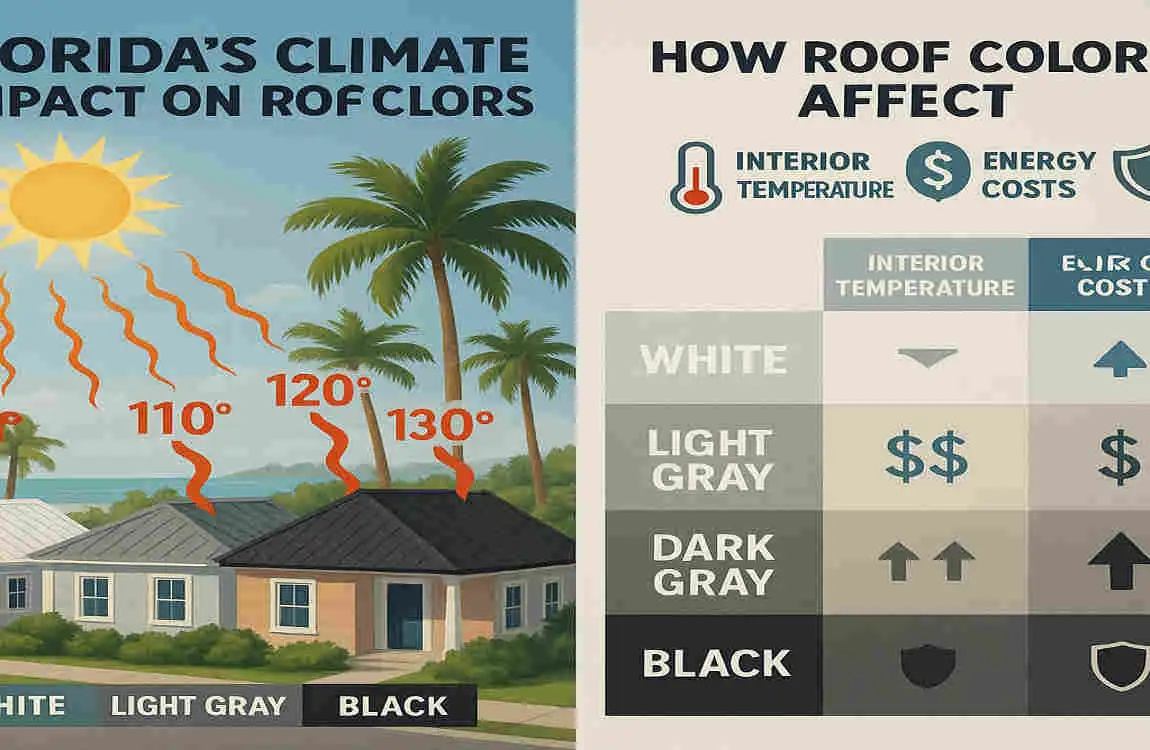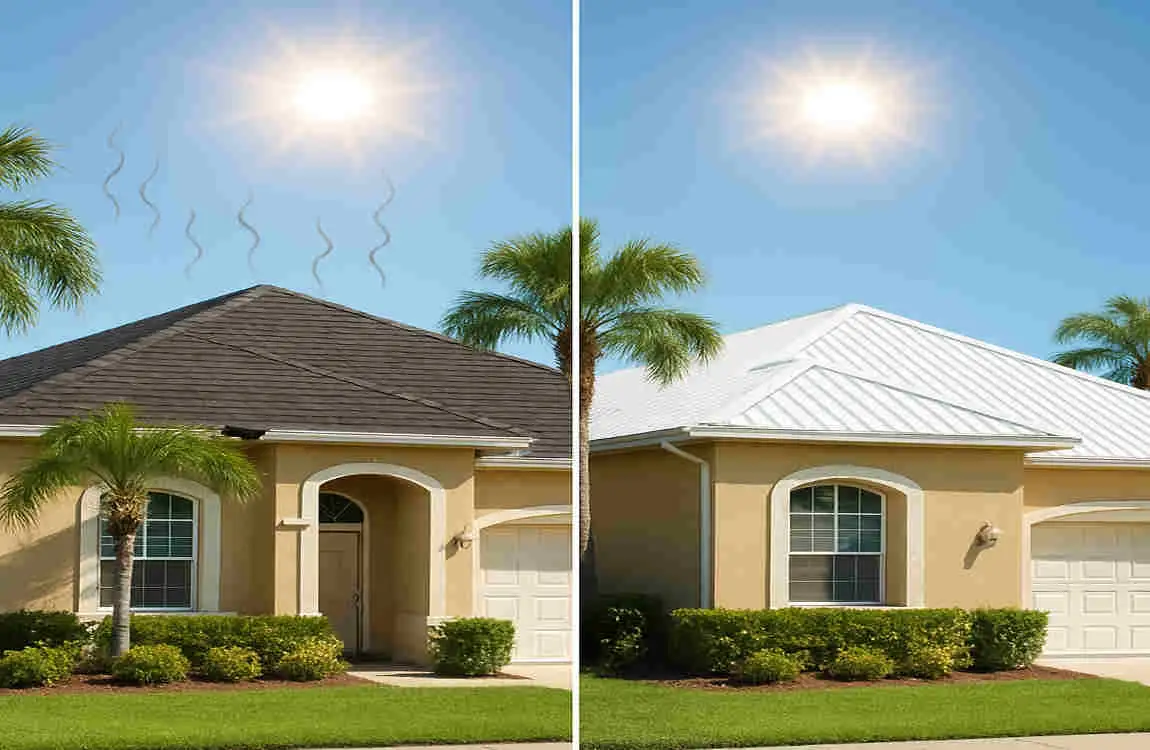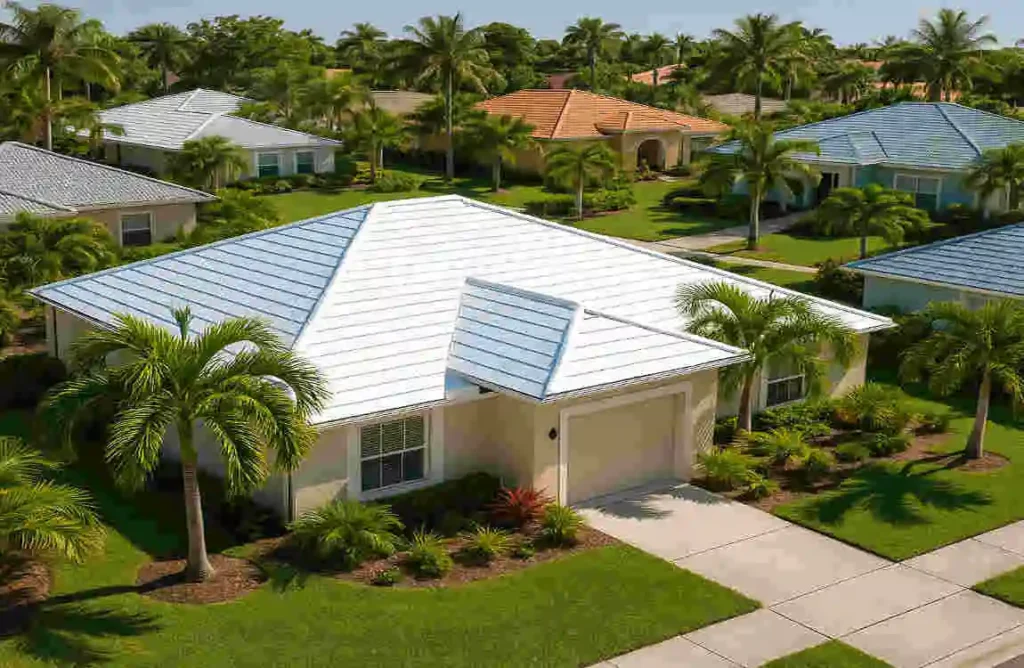When it comes to your Florida home, the color of your roof is more than just a style choice. It can significantly impact your comfort and energy bills. So, what color roof is best for Florida?
Florida’s unique climate, with its intense sunlight and high humidity, demands careful consideration when selecting a roof color. The right choice can help keep your home cooler, reduce your energy costs, and enhance your home’s curb appeal.
Understanding Florida’s Climate and Its Impact on Roof Color

Florida’s Hot, Humid, and Sunny Weather
Florida is known for its warm, humid climate and abundant sunshine. These conditions can be a blessing for outdoor enthusiasts, but they also pose unique challenges for homeowners, especially when it comes to roofing.
Intense Sunlight and Roofing Materials
The intense sunlight in Florida can take a toll on roofing materials over time. UV rays can cause fading, cracking, and deterioration, leading to costly repairs or premature roof replacement. The color of your roof plays a crucial role in managing these effects.
Managing Heat Absorption and Reflection
In Florida’s hot climate, the color of your roof can significantly impact the temperature inside your home. Darker colors tend to absorb more heat, while lighter colors reflect it. This is where the concept of “what color roof is best for in Florida” comes into play.
By choosing a roof color that reflects more sunlight, you can help keep your home cooler and reduce the strain on your air conditioning system. This not only improves your comfort but can also lead to energy savings over time.
How Roof Color Affects Energy Efficiency in Florida Homes
Solar Reflectance and Thermal Emittance
When it comes to energy efficiency, two key factors to consider are solar reflectance and thermal emittance. Solar reflectance is the ability of a surface to reflect sunlight, while thermal emittance is the ability of a surface to radiate absorbed heat.
Light vs. Dark Roof Colors
In Florida’s climate, the color of your roof can significantly affect these factors. Light-colored roofs tend to have higher solar reflectance, meaning they reflect more sunlight and absorb less heat. This can help keep your home cooler and reduce the need for air conditioning.
On the other hand, dark-colored roofs absorb more sunlight and can cause your home to heat up more quickly. While dark roofs may have a certain aesthetic appeal, they can lead to higher energy costs in the long run.
Energy Savings Potential
By choosing a light-colored roof, you can save on your energy bills. Studies have shown that light roofs can reduce cooling costs by up to 20% compared to dark roofs. Over time, these savings can add up and offset the initial cost of your roofing material.
Practical Examples from Florida Homes
Let’s take a look at a real-life example. A homeowner in Miami decided to replace their dark asphalt shingle roof with a light-colored metal roof. After the installation, they noticed a significant reduction in their energy bills during the hot summer months. The light roof reflected more sunlight, keeping their home cooler and reducing the need for air conditioning.
Linking Energy Cost Reduction to Environmental Benefits
Choosing an energy-efficient roof color not only benefits your wallet but also the environment. By reducing your energy consumption, you’re helping to lower greenhouse gas emissions and combat climate change. It’s a win-win situation for both your home and the planet.
So, when considering “what color roof is best for Florida,” keep in mind the potential energy savings and environmental benefits of a light-colored roof.
Popular Roof Colors for Florida Homes — Style and Comfort Considerations
Common Roofing Materials in Florida
In Florida, you’ll find a variety of roofing materials, each with its own set of color options. Some of the most popular choices include:
- Tile roofs
- Metal roofs
- Asphalt shingle roofs
Ideal Colors for Each Roofing Type
When choosing the best color for your Florida roof, it’s essential to consider the material you’re working with. Here are some ideal color options for each type:
Tile Roofs
- Light tans
- Whites
- Grays
Asphalt Shingle Roofs
- Light browns
- Cool grays
Metal Roofs
- Reflective metals (such as silver or light gray)
Balancing Aesthetics and Functionality
While style is an important consideration, it’s crucial to balance aesthetics with the functional benefits of your roof color choice. In Florida’s hot climate, lighter colors can help keep your home cooler and more energy-efficient.
However, that doesn’t mean you have to sacrifice curb appeal. Many light-colored roofing options, such as light tans or cool grays, can still enhance your home’s overall look while providing the benefits of heat reflection.
Personal Style and Curb Appeal
Your roof color is an opportunity to express your personal style and enhance your home’s curb appeal. Whether you prefer the classic look of a light-colored tile roof or the modern appeal of a reflective metal roof, there are plenty of options to suit your taste.
When considering “what color roof is best for Florida,” think about how the color will complement your home’s exterior and landscaping. A well-chosen roof color can tie together the overall look of your property and make a lasting impression.
Dark Roofs vs. Light Roofs: Pros and Cons in the Florida Context

Benefits and Drawbacks of Dark-Colored Roofs
Dark-colored roofs have their own set of advantages and disadvantages in Florida’s climate:
Pros:
- Stylish and bold appearance
- Can complement certain architectural styles
Cons:
- Absorb more heat, leading to higher indoor temperatures.
- May result in higher energy costs for cooling
- It can fade more quickly due to intense sunlight
Benefits and Drawbacks of Light-Colored Roofs
On the other hand, light-colored roofs offer their own set of pros and cons:
Pros:
- Reflects more sunlight, helping to keep your home cooler.
- Can lead to energy savings on cooling costs
- Tend to be more durable and require less maintenance.
Cons:
- May not suit all architectural styles or personal preferences
- It can appear less bold or dramatic compared to dark roofs
Neighborhood and Home Considerations
When deciding between a dark or light roof, consider the specific needs and characteristics of your home and neighborhood. For example, if you live in a historic district with strict design guidelines, a dark roof may be more appropriate. On the other hand, if you’re looking to maximize energy efficiency in a modern home, a light roof could be the better choice.
Addressing Myths and Misconceptions
There are several myths and misconceptions surrounding roof color choices in Florida. Let’s debunk a few:
- Myth: Dark roofs are always better for hurricane protection.
- Reality: Roof color has little to no impact on a roof’s ability to withstand high winds and storms. The material and installation quality are far more critical factors.
- Myth: Light roofs are always more expensive than dark roofs.
- Reality: The cost of a roof depends on many factors, including the material, size, and complexity of the installation. Light-colored options are available at various price points.
- Myth: Dark roofs are always cooler in the winter.
- Reality: While dark roofs may absorb more solar heat, the difference in winter warmth is minimal compared to the impact on summer cooling costs.
When considering “what color roof is best for Florida,” it’s important to separate fact from fiction and make an informed decision based on your specific needs and priorities.
Additional Factors to Consider When Choosing a Roof Color in Florida
Local Building Codes and HOA Restrictions
Before settling on a roof color, check local building codes and any restrictions set by your homeowners association (HOA). Some areas may have specific requirements or limitations on roof colors to maintain a consistent aesthetic within the community.
Roof Material Compatibility
Not all roof colors are available for every type of roofing material. For example, certain shades may not be suitable for asphalt shingles due to manufacturing limitations. Be sure to consult with your roofing contractor to understand the color options available for your chosen material.
Durability and Maintenance in a Humid Climate
Florida’s high humidity can accelerate the growth of algae, mold, and mildew on roofs. Darker colors may show these stains more prominently, requiring more frequent cleaning and maintenance. Lighter colors tend to be more resistant to visible staining, but regular maintenance is still essential to extend your roof’s lifespan.
Impact of Coastal Salt and Storms
If you live near the coast, the salt in the air can cause corrosion and deterioration of roofing materials over time. Some colors may be more resistant to these effects than others. Additionally, consider the potential impact of storms and hurricanes on your roof color choice. While color itself doesn’t affect a roof’s durability, lighter shades may show less wear and tear from debris and weather exposure.
Balancing Energy Efficiency and Style
As you navigate these additional factors, remember to maintain a balance between energy efficiency and style. Lighter colors may offer better heat reflection and energy savings, but if they clash with your home’s aesthetic or violate local regulations, they may not be the best choice. Work with your roofing professional to find a color that meets your needs across all these considerations.
Expert Tips for Selecting the Best Roof Color for Your Florida Home
Practical Advice from Roofing Professionals
When it comes to choosing the perfect roof color for your Florida home, it’s always a good idea to seek advice from local roofing experts. They have firsthand knowledge of the climate, building codes, and popular styles in your area. Here are some tips they might share:
- Consider your home’s architectural style and the overall aesthetic you want to achieve.
- Think about the color of your home’s exterior and how the roof color will complement or contrast with it.
- Don’t forget the energy-efficiency benefits of lighter colors, especially in Florida’s hot climate.
- Keep in mind any local building codes or HOA restrictions that may limit your color choices.
Testing Colors Before Making a Decision
Before committing to a roof color, it’s wise to test a few options. Here’s how you can do that:
- Request color samples from your roofing contractor and place them on your roof for a few days to see how they look in different lighting conditions.
- Consider conducting a reflective test by measuring the temperature of the samples on a hot day to see which color stays coolest.
- Please take photos of your home with different color samples and compare them side by side to visualize the impact of each option.
Combining Roof Color with Home Exterior and Landscaping
Your roof color doesn’t exist in isolation; it’s part of your home’s overall design. When making your choice, consider how the color will work with your home’s exterior and landscaping:
- If your home has a bold or colorful exterior, a more neutral roof color may help balance the overall look.
- On the other hand, if your home’s exterior is more subdued, a bolder roof color could add visual interest.
- Think about how the roof color will complement or contrast with your landscaping, including the colors of your plants and trees.
By taking these factors into account and following the expert tips above, you can make an informed decision about “what color roof is best for your home in Florida” for your specific home and needs.
